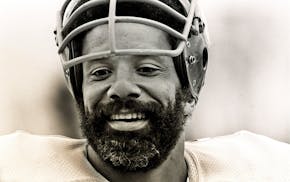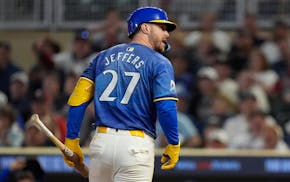A considerable amount of time and energy has been spent this year pondering what Anthony Edwards is and what he isn't.
It's been a year of transition for the Timberwolves and their still-young fifth-year star after a stunning trade of Karl-Anthony Towns right before the start of training camp.
The move left Edwards as the Wolves' clear No. 1 option and only foundational star player while also providing additional depth in the present (Julius Randle and Donte DiVincenzo) and the future (a 2025 first-round draft pick via Detroit).
Edwards is having a good season, averaging career-highs in many categories including points per game (27.3) and three-point accuracy (39.5%). He is undoubtedly the Wolves' most important player.
Perhaps a more interesting and pertinent question, though, is this one: Who is the Wolves' second-most important player?
The fact that there are a lot of options but not necessarily a clear answer reveals both the weakness and strength of the Wolves, particularly as they try to make a push to get into and advance in the postseason — something Chris Hine and I talked about on Thursday's Daily Delivery podcast.
The candidates for second-most important Wolves player?
Rudy Gobert: He was last year's Defensive Player of the Year and gives the Wolves an undeniable presence. But they are also 6-4 without him this season, including two wins over Oklahoma City, and against bad matchups he might not be on the court at all.
Julius Randle: The Wolves went 5-8 without him in February, and after a clunky start he has been a better fit as the replacement for Towns at power forward. But Randle isn't always efficient, turns the ball over in bunches and is tied for fifth on the team with DiVincenzo in terms of value over replacement players.
Jaden McDaniels: He asserted himself offensively this season in a way that he never has before, and he remains the team's best perimeter defender. But McDaniels still isn't wholly reliable as an offensive player and his three-point shooting remains suspect.
Mike Conley: This is less about Conley's prowess and more about the drop-off between his good games and bad games (the latter of which have been more frequent this season though less so lately). As he goes, often so go the Wolves.
Naz Reid: He's largely a reserve unless there are injuries to Gobert or Randle. But he is probably the Wolves' second-best offensive player.
DiVencenzo and Nickeil Alexander-Walker: Probably not realistic contenders as second-most important players overall, but but are valuable and can be the second-most important players on given nights.
When healthy, those players plus Jaylen Clark, T.J. Shannon and others give the Wolves remarkable depth.
In the playoffs, the rotation will probably be eight-deep (at most). As Hine noted on Thursday's podcast, the Wolves' depth gives them the versatility to "shape-shift" into different versions of themselves to better match up with or exploit an opponent.
That's good, especially in a long series against the same opponent.
But the lack of a clear No. 2 also is suggestive of a large burden on Edwards, which perhaps shows up most glaringly in the Wolves' poor performance in clutch situations.
That's bad, especially in a long series against a very good opponent.
Coco Gauff defeats top-ranked Aryna Sabalenka in 3 sets to win her first French Open title
A $2.8 billion settlement will change college sports forever. Here's how

Souhan: Anxiety and depression in the NFL helped inspire Lindsey Young's children's book

Reusse: Country boy Jim Marshall never lost his lust for life
